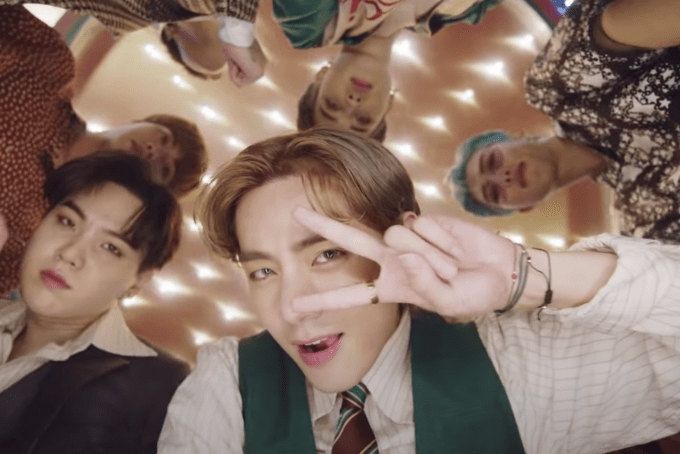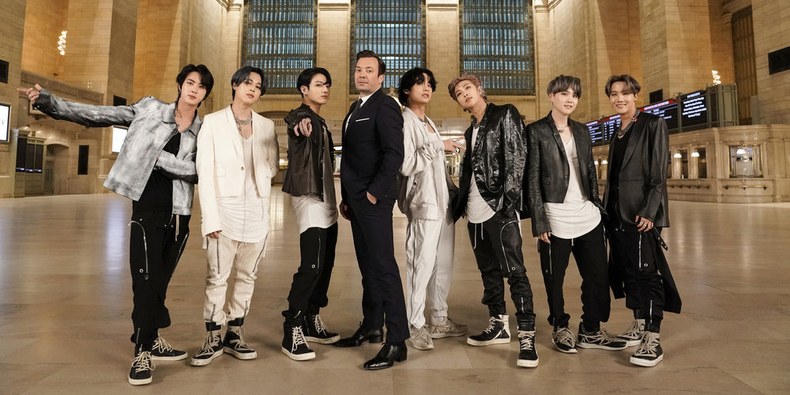
On a late November afternoon in 2020, BTS were nominated for a Grammy for Best Pop Duo/Group Performance. This wasn’t technically their first nomination, but it was the first time that the Grammys, the United States’ biggest music awards show, have officially recognized BTS’ music. ARMY went wild. American media proclaimed it a milestone moment. And I felt nothing.
Okay, maybe it wasn’t exactly nothing. But it certainly wasn’t euphoric joy. One reason for my personal lack of enthusiasm is BTS’ complicated history with the Grammys. The Recording Academy, the Grammys‘ voting body, has been dangling a major nomination in front of BTS for several years. All the while, they have gotten the group to appear on their show and bring the staggering power of ARMY viewership with them. The Recording Academy’s questionable behavior mirrors a pattern several Western awards shows have engaged in.
Another reason for my missing excitement is the sketchy reputation the Grammys have among many American music fans, myself included. What has caused this? For some it was Macklemore’s Best New Artist win over Kendrick Lamar. The last straw for others was when Beyonce’s Lemonade lost Album of the Year to Adele. The list goes on. No matter what specific snub rubs you the most wrong, the point is that the Recording Academy have become infamous for valuing money over creativity, and for failing to honor clearly deserving artists of color.

There’s a lot that is imperfect about BTS’ Grammy nod. However, when I took a step back from my personal opinions, I realized that this nomination is indeed momentous. However, its importance might not be for the most obvious reasons, and its potential impact on BTS’ career and K-pop as a whole could likewise be surprising.
One crucial reason BTS’ Grammy nod is important is because it is important to BTS themselves. The unfiltered joy in their viral reaction video is truly moving. It also shouldn’t be surprising, given how open BTS have been about a Grammy nomination being a major group goal. They’ve come a long way from their beginnings as underdog idols. Now they are South Korea’s biggest selling pop artists ever. They have spurred change in the country’s generally immovable military enlistment policies. And they are the first Grammy-nominated K-pop act.
BTS have made many sacrifices to get here. One of the most dramatic involves their artistry. They began as bold, socially-conscious rebels. What they are now is something decidedly less unique. This is no accident. As BTS have become more laser-focused on conquering Western markets, they have tailored their music to be as accessible and inoffensive as possible.
Early examples of BTS’ lean towards a more pop-heavy style retained much of their original flair. Think of seminal releases like “Blood Sweat & Tears” and “DNA”. More recent comebacks have, sadly, been less distinctive. “Boy with Luv” and “On” are perfectly adequate songs, but are they anything special? More importantly, do they seem like they come from the same electrifying songwriting and performing team that created tracks like “Second Grade” and “Silver Spoon (Baepsae)”?
No song prompts these questions more than “Dynamite”, the very release which has earned BTS their Grammy nomination. “Dynamite” is the definition of pop mediocrity. Its entirely English lyrics, a first for BTS, are empty of meaning. Its take on disco is all surface, no substance, and unusually, has no BTS members took part in the creation of the song. As some have noted, it feels strange that BTS have earned Grammy recognition, plus a historic number one on the Billboard Hot 100, with a song that feels so removed from the characteristics which made them global superstars in the first place.

Of course, the point of “Dynamite” is that it is excessively palatable. Big Hit Entertainment and BTS knew what they were doing when they released the song. They have chosen time and time again to prioritize Western recognition over all else, increasingly favoring American television appearances and press over South Korean. You can disagree with this choice and bemoan the decay of BTS’ distinct creativity. I certainly do. You can also argue that “Dynamite” was a temporary artistic compromise that has led to unprecedented recognition for BTS’ subsequent, more BTS-like work.
Regardless, there is no denying that BTS have deliberately and painstakingly built a path to this Grammy nomination. They deserve congratulations for accomplishing their goal. But besides the personal meaning to BTS, what else makes their Grammy nod significant?

The biggest and broadest importance attached to the nomination is the reason for its existence: K-pop’s relentlessly growing global and American commercial power, with BTS leading the charge. This growth is BTS and K-pop’s most noteworthy accomplishment thus far, certainly more remarkable than a single awards nomination. Nonetheless, it is a notable sign of K-pop’s current worldwide strength that the Recording Academy has been compelled to officially recognize BTS.
To put this in context, the Grammys usually can’t even be bothered to honor women or hip-hop artists. Gender parity seems like a pretty small ask, and hip-hop is, according to some sources, the most popular music genre in the United States. The entire American music industry is plagued by racism and selective xenophobia. It is hard to overstate how impressive it is that BTS’ influence has overpowered these barriers, resulting in a coveted Grammy nod.

The nomination itself is significant, even if some have noted that BTS probably deserve more than one nod, and in bigger categories. What would truly take it over the edge though is if BTS actually won. That would be a symbolic victory of huge proportions, for BTS, K-pop, and the entire Hallyu wave. It would likely cause elation matching, if not exceeding, the joy which met Parasite’s Oscar wins.
A Grammy win would indicate that the American music industry isn’t just begrudgingly allowing BTS in, but welcoming them with open arms. Just how likely is this? It’s hard to say. In many ways, it would be smart for the Recording Academy to give BTS the win. It would go a long way to appeasing fans who have been less than psyched about the Grammys‘ prior treatment of BTS and K-pop in general.
Honoring BTS properly would also make the Grammys seem more relevant. They could certainly use it. As the Grammys’ credibility has decreased, so have their viewership. The Recording Academy desperately needs to get back on music fans’ good side.

Despite these incentives, I’m personally pessimistic. It took so much to force the Grammys to even nominate BTS. If getting a win follows the same ratio of accomplishment to Recording Academy recognition, BTS will have to make first contact with extraterrestrial life and consequently conquer Martian music charts before they can take home a Grammy trophy.
Whatever the outcome on January 31, 2021, BTS’ nomination alone is enough to significantly impact the broader K-pop industry. After all, they are far from the only group to have Western domination on their bucket list. What effect will BTS’ Grammy nod have on K-pop?
A predictable consequence is that more groups will view Grammy nomination as achievable, and they may take concrete steps towards that goal. This could be a mistake. As BTS’ journey shows, the artistic compromises a K-pop group have to make to be palatable to the Recording Academy are no joke. For BTS, they determined that those sacrifices were worth it. Other groups should think carefully about whether or not they feel the same way.

This is especially true because while Grammy recognition is nothing to scoff at, it is not indispensable. It is possible to achieve American, Western, and global music stardom without the approval of the Recording Academy. This isn’t just true for K-pop acts, but also for American and/or English-speaking artists.
Ironically, BTS are living proof of this. By so many metrics, they were a triumphant worldwide success long before the Grammys deigned to honor them. For BTS though, a Grammy nomination was something they wouldn’t feel satisfied without. Being nominated isn’t likely to significantly change the trajectory of their career. They can’t get much bigger than they already are! Nevertheless, BTS deserve congratulations for breaking through some serious barriers to achieve their Grammy goal.
That being said, the Grammys are only one tool in the global music recognition toolbox, and an increasingly obsolete one at that. If the Recording Academy has any wherewithal, they will jump on the K-pop bandwagon while they still have the chance. With or without the Grammys’ stamp of approval, BTS and many other K-pop groups are speeding towards unprecedented levels of worldwide popularity. Now that’s something worth celebrating.
(ABC News, Billboard: [1][2][3][4], Business Insider, CNN, Dazed, Film Daily, Forbes, Grammy Awards, Guardian, Hollywood Reporter: [1][2][3], Korea Times, Market Watch, Paste, Rolling Stone: [1][2], South China Morning Post (Young Post), Teen Vogue, Time, USA Today, Vox, Vulture, Washington Post, YouTube. Images via ABC, Academy of Motion Picture Arts and Sciences, Big Hit Entertainment, CBS, Debi Del Grande, Grammy Awards, Matt Petit, NBC, Recording Academy, Tonight Show with Jimmy Fallon, YG Entertainment)


